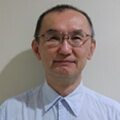Qualifications
PhD (Health Sciences), MSc (Health Sciences)
Personal/work Web page addresses
Old record:http://archives.chikyu.ac.jp/archives/AnnualReport/Viewer.do?prkbn=R&jekbn=E&id=98
Research gate or Linked-in account links
http://www.researchgate.net/profile/Kazuhiko_Moji
Affiliation(s)
- Graduate School of Tropical Medicine & Global Health, Nagasaki University, Japan
- Institute of Tropical Medicine, Nagasaki University
- School of Global Humanities and Social Sciences
- Research Institute for Humanity and Nature (RIHN), Kyoto, Japan: Professor Emeritus
Background
I graduated from the University of Tokyo (UT) in 1976 (BSc. in Health Sciences) , Then, I was in UT until I am 34 as a research student in the department of human ecology (1976-1978), a master course student (1978-1980), a PhD student (1980-1983), and a research associate (1983-1987). I joined to Nagasaki University in 1987, as an associate professor of public health at School of Medicine, then as a professor of community health at School of Allied Medical Sciences in 1999. From 2002, I moved to Nekken, Institute of Tropical Medicine as a professor at the Research Center for Tropical Infectious Diseases (RECTID). Between 2007 and 2013, I was in Research Institute for Humanity and Nature (RIHN), Kyoto, as a project leader of “The RIHN Ecohealth project: Environmental Change and Infectious Diseases in Tropical Asia. After the RIHN Ecohealth project, I joined again to Nagasaki University, being professor and dean of the graduate school of international health development, which is the precursor of this graduate school of tropical medicine and global health.
Teaching
Based on my back ground of human ecology, I will be teaching various aspects of bio-social approach to global health. Bio-medical science and epidemiology are very important part of global health. Yet, students need to acquire enough knowledge on wider bio-social context of each society which is shaping the health of the people, in order to contribute to the sustainable development goals of global health. Students need to understand people’s life, their environments, their society’s history, culture, social and political system, public health systems and so on. I will teach the following modules: Global Health in the autumn quarter, Health Promotion Ⅰand Ⅱ in the winter quarter. And I will serve as an organizer/coordinator for Health System and Policy Ⅰand Ⅱ, and Social Entrepreneurship.
Research
I have been studying human ecology of people living in various environments in Asia, Africa and South America. Based on intensive field work in rural communities, I studied demographic events (death, pregnancy, birth and in/out migration), time-allocation of human activities, their interaction with environment, food acquisition, diet, energy and nutrient intake, and energy output. Then, I started to study health ecology of parasitic diseases such as schistosomiasis haematobium in Kenya, malaria in Indonesia and Lao P.D.R. and liver fluke infection in Lao P.D.R. I have been interested in ecohealth/human ecology approaches (non-pharmaceutical approaches) to reduce the burden of these parasitic diseases and to accelerate health transition.
The country/countries where you work currently
Currently: Lao P.D.R, and Indonesia
In the past: Japan, Kenya, Bolivia, Bangladesh, China, and Vietnam
Five MOST IMPORTANT/INTERESTING recent publications
- Density dependence in a seasonal time series of the bamboo mosquito, Tripteroides bambusa (Diptera: Culicidae) Hoshi, T., Imanishi, N., Moji, K., Chaves, L.F. 2017 Canadian Entomologist 149(3), pp. 338-344
- The role of domestic dogs in the transmission of zoonotic helminthes in a rural area of Mekong river basin Sato, M.O., Sato, M., Yoonuan, T., (…), Moji, K., Waikagul, J. 2017 Acta Parasitologica 62(2), pp. 393-400
- Application of environmental DNA analysis for the detection of Opisthorchis viverrini DNA in water samples Hashizume, H., Sato, M., Sato, M.O., (…), Moji, K., Minamoto, T. 2017 Acta Tropica 169, pp. 1-7
- Household clustering of asymptomatic malaria infections in Xepon district, Savannakhet province, Lao PDR Pongvongsa, T., Nonaka, D., Iwagami, M., (…), Mita, T., Kano, S. 2016 Malaria Journal 15(1),508
- Morbidity assessment of Opisthorchis viverrini infection in rural Laos: I. Parasitological, clinical, ultrasonographical and biochemical findings Feldmeier, H., Hazay, M., Sato, M., (…), Sopraseuth, V., Moji, K. 2016 Tropical Medicine and Health
Link to all publications
Message
The world is full of contradictions and irrationalities. Imagine you come from a poor African or tropical Asian family. How would you avoid disease and survive? What would you eat? What would you do to stay alive? If you had no schooling and were illiterate, would you be able to live despite society’s disdainfulness? The starting point in international health development is saying to yourself, “for those people in poor countries, living itself is already a great achievement. As for me, who live in a blessed environment, what am I doing to make a difference?” Our answer is that we can learn and think, developing ourselves as useful human resources and take up our responsibilities according to our capacity. To achieve this goal, I will strive to make the School of Tropical Medicine and Global Health a meaningful place for education, research, and practice, together with the faculty and students.

